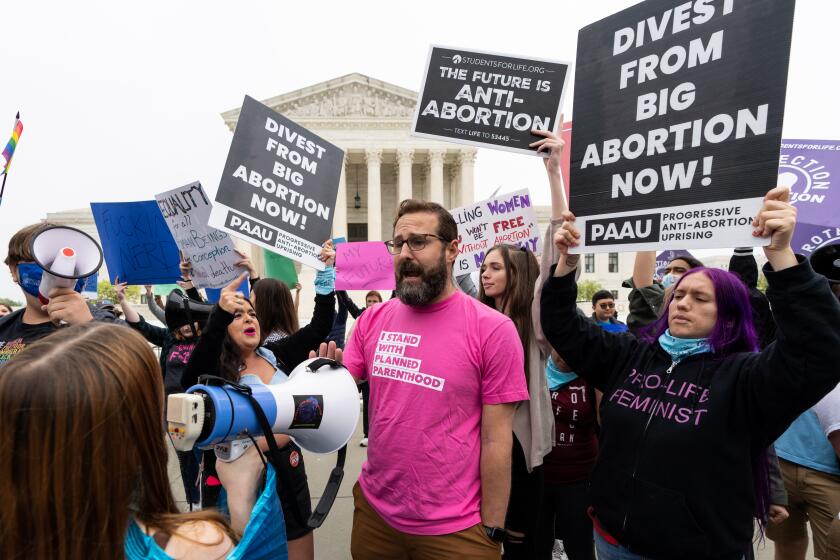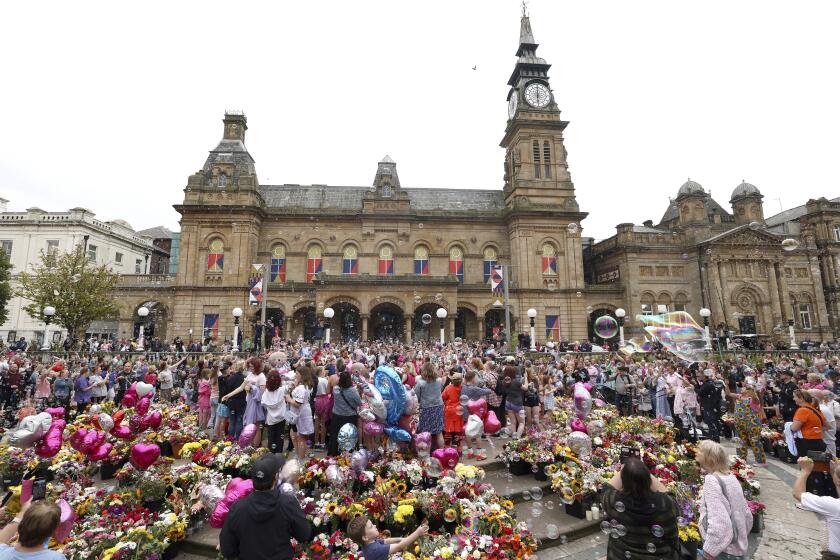Israel May Strike Syria Over Pair of Suicide Bombings
Israel on Wednesday bluntly threatened to attack targets in Syria to retaliate for a pair of near-simultaneous suicide bombings that killed 16 passengers and wounded dozens of others aboard two crowded commuter buses in the southern city of Beersheba.
Although the bombers belonged to a local cell of the Palestinian militant group Hamas operating out of the West Bank city of Hebron, Israeli officials said there was direct evidence that Hamas leaders in Damascus, the Syrian capital, had orchestrated Tuesday’s attack.
“Syria is continuing to harbor the leaders of these terrorist groups,” said Raanan Gissin, a senior aide to Israeli Prime Minister Ariel Sharon. “That’s where the orders emanated from -- we have hard proof of that. And geographical location is not going to serve as immunity for anyone.”
A similarly worded warning came from the Israeli army chief of staff, Lt. Gen. Moshe Yaalon, speaking to a parliamentary committee. “Anyone responsible for terror against us shouldn’t sleep soundly at night,” he said.
Yaalon cited as potential targets the Palestinian Authority, Lebanon-based militant group Hezbollah and “the terrorist command in Damascus, which operate with Syrian approval.”
In October, Israel carried out an air raid on what it called a Palestinian militant base outside Damascus in retaliation for what it said was the dispatching of an attacker by the Damascus-based leadership of another Palestinian group, Islamic Jihad. The raid stoked fears of a regional confrontation.
Weeping mourners thronged the funerals of the Beesheba victims, and Israeli troops descended in force on Hebron, sealing off the city.
The youngest bombing victim was 3-year-old Aviel Atash.
“He was supposed to go to preschool this morning with all his friends,” Beersheba’s mayor, Yaakov Turner, told mourners. Of Aviel’s mother, Rachel, who was hospitalized, Turner said: “She didn’t know they were spending her child’s last day together, and that she will never see him again.”
In another familiar national ordeal, it took more than 24 hours for the victims to be identified. In the confines of a bus, which traps the force of a blast, the bodies of those seated near a suicide bomber are usually so mangled that they must be forensically identified using dental records or scattered parts.
Moving into Hebron in the early-morning hours, Israeli troops rounded up dozens of Palestinian men and destroyed part of a compound belonging to the family of one of the bombers. The army said the operation was the beginning of a campaign against leaders of Hamas in the area.
The two attackers, 26-year-old Ahmed Kawasme and 22-year-old Nassim Jabari, were members of a clan-based Hamas cell led by Kawasme’s cousin Imad.
Israel has decimated the Gaza Strip-based infrastructure of Hamas over the last 18 months, killing almost all its founding members. Largely because of that, the influence of its leaders in Damascus -- including Khaled Meshaal, whom Israel has tried to kill -- has grown.
But not everyone is convinced that the Syria-based leadership is culpable in the Beersheba bombings.
The Kawasme cell in Hebron has a reputation, even among fellow militants, as a rogue operation that plans and carries out its own attacks, largely to avenge its dead rather than to pursue a larger political goal.
Because of its clan-based nature, the Hebron branch of Hamas has been almost impossible for Israeli security services to infiltrate. It has continued to carry out attacks despite the rounding up last year of hundreds of members of the clan and the Israeli assassinations of several of its key leaders.
“If we knew more about that cell, it wouldn’t still be there now,” said Eran Lerman, a former senior intelligence official. “People are guessing. Certainly there are West Bank cells [of Hamas] run from Damascus, but at the end of the day, I’m not sure we have enough evidence.”
The Beersheba bombings, the first inside Israel in nearly six months, have given ammunition to opponents of Sharon’s plan to withdraw from the Gaza Strip. They say such a pullout would be read by groups like Hamas as a sign of weakness.
Sharon has brushed aside such claims, but on Wednesday he promised to speed up construction of the barrier Israel is building in the West Bank. The fence’s southern leg, the part that will lie close to Beersheba, has not yet been built.
“The fence will be completed ... and we are doing all we can to speed up the process as much as possible,” Sharon told reporters in Jerusalem.
The barrier has drawn international condemnation, largely because of the hardships it has caused Palestinians living near its path. Those residents, backed by human rights groups, say the barrier cuts tens of thousands of them off from their schools, farm fields, relatives and medical care.
Wednesday marked the first day of the school year in Israel, and many mothers struggled with how to explain the renewed violence to their children.
“It was very hard for me to let them out of my sight today,” said Orna Shaul, a Tel Aviv mother of a 5-year-old and an 8-year-old.
“I told my kids to use their eyes, to look around them, to always be alert,” said another mother of two, Sigal Avrahami. “I’m scared. I’m scared for all of us.”
More to Read
Sign up for Essential California
The most important California stories and recommendations in your inbox every morning.
You may occasionally receive promotional content from the Los Angeles Times.










